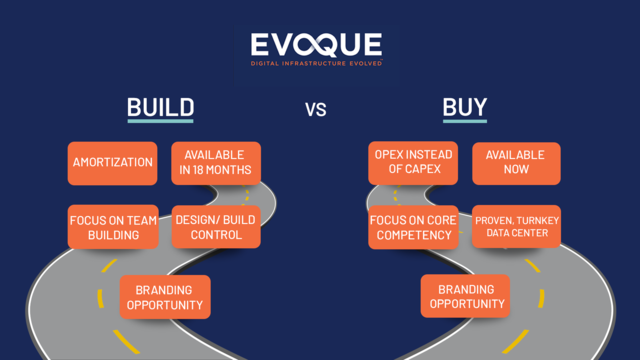August 25
When it’s time to upgrade from an outdated on-premise data solution, organizations that aren’t ready to make a complete transition to the cloud must instead choose between building an entirely new private facility or migrating their assets into a colocation data center where they’ve leased space, power, and cooling. While this decision can be impacted by very real IT issues related to security, control, and transparency, the primary factor to consider is almost always cost.
The Build vs Buy Dilemma
For companies that have always had an on-premises data solution, it’s natural for them to explore the prospect of replacing their infrastructure with a newly constructed facility. But building a new, state-of-the-art data center represents a significant capital investment and typically requires careful planning and extensive organization to complete. While these facilities offer the attractive prospect of control and the potential for diminishing costs over time, the massive initial investment can be daunting for all but the largest enterprises.
Colocation services, on the other hand, can provide many of the advantages of a purpose-built data center without the steep up-front investment associated with construction. Organizations can even decide to lease servers instead of migrating existing equipment, which allows them to shed the ongoing costs of maintaining and replacing IT equipment. Of course, those costs don’t disappear entirely, but are instead folded into the recurring operational costs paid to the colocation provider. Over time, those costs may reach a point where they exceed the total cost of building a private data solution.
To make the best choice for their IT infrastructure, organizations need to take a long, hard look at their business needs and assess how their technology requirements might evolve over time. While it may be easy to calculate costs based on the present and near future, it’s important to remember that innovations over a five to ten year timeframe can completely transform IT strategies, so it’s important to keep the potential for flexibility and agility in mind.

Calculating the TCO of a Data Center
There’s no getting around the fact that building a private data center is expensive. First and foremost, there’s the cost of obtaining the raw space itself, whether that means acquiring an existing structure or securing the land where a new facility can be constructed. Once the data center shell is in place and prepared for use, the company must then arrange for sufficient power and internet connectivity to support their operations. If no electrical or fiber lines are in place already, they’ll need to be extended from existing lines elsewhere, which could be quite costly if the facility isn’t in a convenient location.
After the new facility has power and internet connectivity (preferably from more than one provider to ensure redundancy, which will incur additional costs), basic data center infrastructure needs to be installed. This includes uninterruptible power systems (UPS), backup generators, networking equipment, cabling, server cabinets, and cooling infrastructure like HVAC systems.
One factor that’s often overlooked when estimating data center costs is its capacity over time. While the facility will likely be built to accommodate a certain amount of growth over time, it’s often hard to determine how much additional capacity will be needed. This is important because any TCO (total cost of ownership) calculation assumes that the facility will be used over a specified time horizon (usually ten years). A purpose built facility may appear to offer lower costs than a colocation facility over the course of a decade, but if it reaches its capacity in year six, the organization will either need to build another facility or take on cloud or colocation expenses in addition to the original construction costs.
To get a rough idea of how building a data center compares to colocation over time, Schneider Electric has provided an easy-to-use data center TCO calculator that takes a number of these factors into consideration. Keep in mind, however, that it doesn’t account for a rapid increase in demand that could cause a company to outgrow its data center faster than anticipated. It also doesn’t address connectivity costs, which is an area where colocation services offer distinct advantages.
Why Colocation is a Better Choice for Most Companies
For most organizations, the high capital costs of building a private data center are simply too great. Constructing and managing a dedicated facility necessarily means getting into the business of day-to-day data center operations and management. That takes the form of ongoing operational expenses to maintain and secure both IT equipment and the site itself. In some ways, an organization with a private data center has to be equal parts technology company, property manager, managed services provider, and private security firm. It’s a lot to take on, especially for smaller companies that need to invest every available resource into developing innovative products and services if they want to stay ahead in a competitive market.
Colocation provides organizations with all the benefits of an enterprise data center without having to invest in constructing or maintaining one. For an ongoing operational fee, they can rent both rackspace and servers from the colocation provider along with all the connectivity services they need to support their applications. The great thing about colocation is that scaling capacity upward or downward is a simple matter of renting more space from the provider. Most colocation facilities are designed to house multiple tenants and have more than enough infrastructure available to accommodate growth. They also have extensive connectivity options that allow customers to expand their capacity by way of hybrid clouds that combine private deployments with scalable public cloud platforms.
Build to Suit: The Best of Both Worlds
In recent years, colocation providers like Evoque Data Center Solutions have offered organizations a new alternative for accommodating their growing IT infrastructure in the form of build-to-suit data center services. These custom, private deployments greatly simplify the up-front investments and logistics involved with building a data center by providing preselected sites, customized annexes adjacent to existing colocation facilities, and move-in ready whitespaces.
Build-to-suit services leverage the expertise of data center professionals to help organizations construct their customized solution in the most efficient way possible. When combined with cloud consulting services, they’re often the best way to deploy hybrid cloud environments that offer near limitless scalability through cloud connectivity. Working closely with a colocation provider also makes it easier to build disaster recovery backup redundancies into the build-to-suit location by connecting to their nearest colocation facility.
Build Your Ideal IT Environment with Evoque
Whether you’re looking to build a customized data center that meets your specific needs or exploring versatile colocation options, Evoque has the services and expertise to facilitate your migration journey. Our innovative build-to-suit services have helped organizations of all sizes construct a facility that’s perfectly matched to their needs without the steep capital cost of building a data center on their own. For organizations transitioning from legacy infrastructure to a state-of-the-art colocation data center, we operate multiple facilities in North America’s key technology markets to get them closer to their customers and provide the workload flexibility their applications need to meet the challenges of the future.
To learn more about Evoque’s innovative data center solutions, talk to one of our experienced specialists today.



